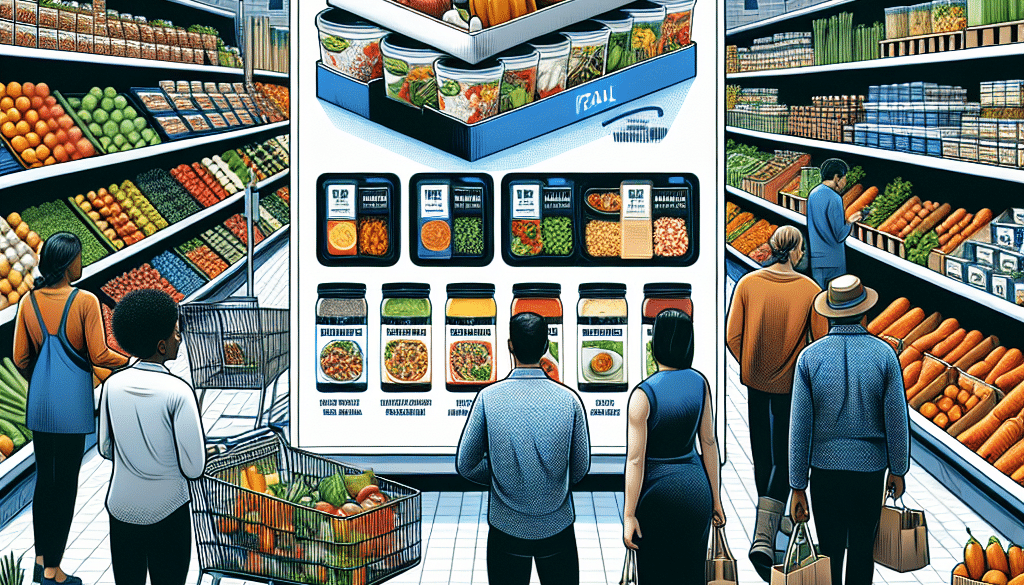Retail Meal Kits: Reshaping the Traditional Market
-
Table of Contents
- Retail Meal Kits: Revolutionizing Home Cooking and Food Shopping
- The Rise of Retail Meal Kits
- Impact on Traditional Grocery Shopping
- Benefits of Retail Meal Kits
- Challenges Facing Retail Meal Kits
- Case Studies: Success Stories and Lessons Learned
- The Future of Retail Meal Kits
- Conclusion: The Transformative Power of Retail Meal Kits
- ETChem: Enhancing Meal Kits with Premium Protein Products
Retail Meal Kits: Revolutionizing Home Cooking and Food Shopping

The advent of retail meal kits has significantly altered the landscape of the traditional food market. These convenient, pre-portioned packages have not only changed the way people think about home cooking but have also impacted grocery shopping habits, restaurant dining, and food waste management. In this article, we will delve into how retail meal kits are reshaping the traditional market, with a focus on their benefits, challenges, and future prospects.
The Rise of Retail Meal Kits
Retail meal kits emerged as a response to the busy lifestyles of modern consumers who seek convenience without compromising on the quality of their meals. These kits come with pre-measured ingredients, step-by-step recipes, and often cater to a variety of dietary preferences and cuisines. The concept has quickly gained popularity, leading to a burgeoning market with numerous companies vying for a share.
- Blue Apron
- Home Chef
- Plated
- HelloFresh
These are just a few examples of companies that have made significant inroads into the meal kit delivery service. According to a report by Grand View Research, the global meal kit delivery services market size was valued at USD 10.26 billion in 2020 and is expected to expand at a compound annual growth rate (CAGR) of 13.0% from 2021 to 2028.
Impact on Traditional Grocery Shopping
Meal kits are changing the way consumers approach grocery shopping. With the convenience of having all the necessary ingredients delivered to their doorstep, many shoppers are bypassing the supermarket aisles. This shift has prompted traditional retailers to adapt by offering their own versions of meal kits or partnering with existing meal kit services.
- Supermarkets incorporating meal kits into their product offerings
- Collaborations between grocery chains and meal kit companies
For instance, Kroger acquired the meal kit company Home Chef in 2018, while other supermarkets have started stocking meal kits alongside traditional food items.
Benefits of Retail Meal Kits
Retail meal kits offer several advantages that contribute to their growing popularity:
- Convenience: They save time on meal planning and grocery shopping.
- Variety: Consumers can explore new cuisines and recipes without the hassle of sourcing specialty ingredients.
- Portion Control: Pre-portioned ingredients help reduce food waste and support dietary goals.
- Quality: Many meal kits prioritize high-quality, often locally sourced ingredients.
These benefits have made meal kits particularly appealing to millennials and dual-income households, who value both convenience and quality in their dining experiences.
Challenges Facing Retail Meal Kits
Despite their popularity, meal kit services face several challenges:
- High Costs: The price point of meal kits can be higher than traditional grocery shopping, limiting their appeal to budget-conscious consumers.
- Environmental Concerns: Packaging waste from meal kits has raised environmental sustainability questions.
- Customer Retention: Maintaining a loyal customer base in a competitive market is challenging for meal kit companies.
Companies are addressing these issues by exploring eco-friendly packaging solutions, offering more affordable options, and enhancing customer service to improve retention rates.
Case Studies: Success Stories and Lessons Learned
Several meal kit companies have stood out for their innovative approaches and successful business models:
- HelloFresh: Known for its global presence and diverse menu options, HelloFresh has seen consistent growth by focusing on customer preferences and efficient logistics.
- Blue Apron: As one of the pioneers in the meal kit industry, Blue Apron has faced ups and downs but remains a key player by emphasizing sustainable sourcing and culinary partnerships.
These case studies demonstrate the importance of adaptability and customer-centric strategies in the meal kit market.
The Future of Retail Meal Kits
The meal kit industry is poised for continued growth, with trends indicating a shift towards more specialized and niche offerings. Future developments may include:
- Increased focus on health and wellness, with kits catering to specific dietary needs
- Expansion into ready-to-eat meal kits for even greater convenience
- Integration of smart technology for personalized meal planning
As the market evolves, meal kit companies will need to stay innovative to meet the changing demands of consumers.
Conclusion: The Transformative Power of Retail Meal Kits
Retail meal kits have undeniably transformed the traditional food market by offering a unique blend of convenience, variety, and quality. While challenges exist, the industry’s adaptability and customer-focused approach suggest a bright future. As consumers continue to seek out convenient meal solutions, retail meal kits will likely remain a significant player in reshaping food consumption patterns.
ETChem: Enhancing Meal Kits with Premium Protein Products
For meal kit companies looking to enhance their offerings with high-quality protein, ETChem’s range of collagen products presents an excellent opportunity. Their extensive selection of collagens, including marine, fish, bovine, and chicken collagen, can add nutritional value and appeal to meal kits focused on health and wellness.
ETChem’s commitment to quality and customer service makes them an ideal partner for meal kit providers aiming to stand out in a competitive market. By incorporating ETChem’s protein products, companies can offer meals that are not only convenient and delicious but also nutritionally beneficial.
About ETChem:
ETChem, a reputable Chinese Collagen factory manufacturer and supplier, is renowned for producing, stocking, exporting, and delivering the highest quality collagens. They include marine collagen, fish collagen, bovine collagen, chicken collagen, type I collagen, type II collagen and type III collagen etc. Their offerings, characterized by a neutral taste, instant solubility attributes, cater to a diverse range of industries. They serve nutraceutical, pharmaceutical, cosmeceutical, veterinary, as well as food and beverage finished product distributors, traders, and manufacturers across Europe, USA, Canada, Australia, Thailand, Japan, Korea, Brazil, and Chile, among others.
ETChem specialization includes exporting and delivering tailor-made collagen powder and finished collagen nutritional supplements. Their extensive product range covers sectors like Food and Beverage, Sports Nutrition, Weight Management, Dietary Supplements, Health and Wellness Products, ensuring comprehensive solutions to meet all your protein needs.
As a trusted company by leading global food and beverage brands and Fortune 500 companies, ETChem reinforces China’s reputation in the global arena. For more information or to sample their products, please contact them and email karen(at)et-chem.com today.




